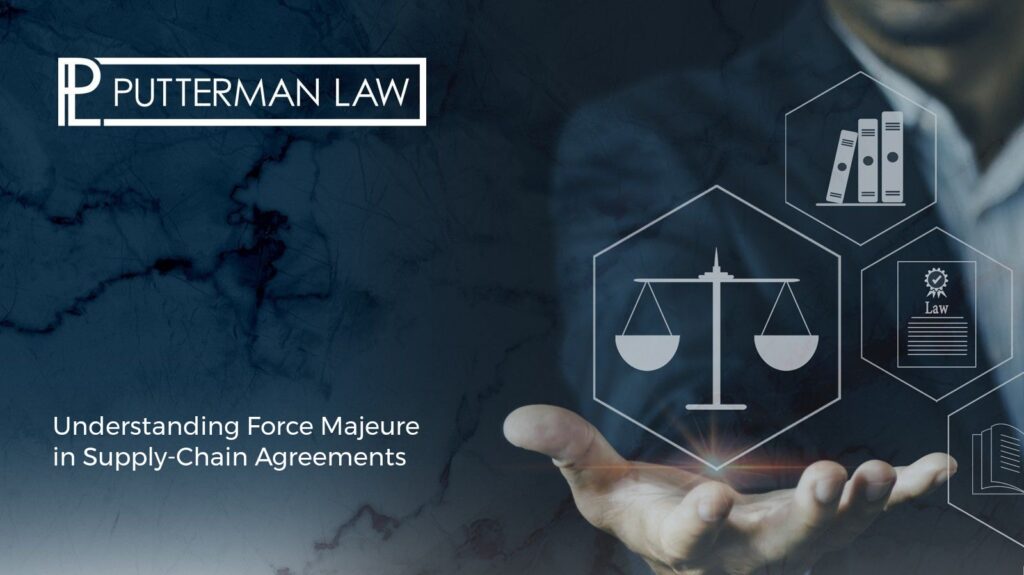Understanding Force Majeure Clauses: Definition and Importance
In the world of supply-chain and logistics agreements, force majeure clauses play a crucial role in dictating how parties handle unforeseen events. But what exactly are they? The term “force majeure” translates to “superior force” in French and refers to extraordinary events or circumstances beyond the control of the parties involved. These clauses aim to protect both buyer and supplier from the legal ramifications related to breaches of contract when such unforeseeable events occur.
Key Elements of a Force Majeure Clause
Effective force majeure clauses typically include several common elements. These elements often cover events such as natural disasters, pandemics, and government actions. A well-defined clause will specify what exactly constitutes a force majeure event, providing clarity and setting clear boundaries. For example, events might range from floods and earthquakes to labor strikes and unprecedented governmental regulations.
Clearly defining what falls under a force majeure event is critical because it reduces ambiguity and ensures that both parties have a mutual understanding of their obligations and protections under such circumstances. This precision is essential for enforcing the clause if a dispute arises.
Recent Relevance: COVID-19 Pandemic
The onset of the COVID-19 pandemic has brought renewed attention to the significance of force majeure clauses in supply-chain and logistics agreements. The global health crisis led to widespread disruptions, affecting contract performance across multiple industries. From canceled manufacturing orders to delayed shipping, businesses have had to invoke their force majeure clauses to navigate these unprecedented times.
In the logistics sector, for instance, some companies faced challenges in maintaining their supply chains due to lockdowns and travel restrictions. These scenarios underscore the importance of having a well-drafted force majeure clause that can effectively address such crises and provide a legal framework for mitigating the resulting risks.
Legal Framework and Enforceability
Understanding the legal framework governing force majeure clauses is essential for their effective utilization. Courts often scrutinize these clauses to ensure they have been drafted clearly and explicitly. To be enforceable, a force majeure clause must clearly define the events that qualify and must reflect the intent of the contracting parties. For instance, courts require that the event was genuinely unforeseeable and beyond the control of the affected party.
The burden of proving that an event qualifies as force majeure rests with the party invoking the clause. This requires demonstrating not only the occurrence of a listed event but also the impossibility of performing the contractual obligations due to such an event. Therefore, specificity in your force majeure clauses can significantly influence enforceability.
Drafting Effective Force Majeure Clauses
Drafting a robust force majeure clause involves more than listing potential events. We recommend including clear definitions and specific examples within your clause. By doing so, you ensure that all parties have a mutual understanding of what qualifies as a force majeure event. This includes natural disasters, pandemics, and government actions.
Here are practical recommendations for drafting an effective force majeure clause:
- Notice Requirements: Specify the amount of notice required to invoke the clause. This helps in ensuring prompt communication and evaluation of the event’s impact.
- Mitigation Obligations: Include obligations for the affected party to take reasonable steps to mitigate the impact of the force majeure event.
- Duration Parameters: Define how long the force majeure event can suspend or delay obligations before termination rights are triggered.
Industry-Specific Considerations: Transportation, Manufacturing, and Retail
Different industries may face unique risks that require tailored force majeure clauses. For instance, in the transportation industry, weather-related disruptions might be more common, whereas the manufacturing sector may deal with supply chain interruptions. As a result, understanding industry-specific risks is crucial.
Here are examples of industry-specific risks and tailored solutions:
- Transportation: Include events such as road closures, port strikes, and severe weather conditions that could interrupt logistics and delivery schedules.
- Manufacturing: Address the risks of material shortages, factory closures, and disruptions in supply chains.
- Retail: Consider retail-specific factors such as store closures, supplier insolvency, and shipment delays.
By customizing force majeure clauses to address specific industry risks, you create a targeted approach that minimizes potential disputes and ensures better preparedness for unforeseen events.
Did you know that force majeure clauses became a spotlight topic due to COVID-19? This pandemic highlighted the essential role of such provisions in supply-chain and logistics agreements.
Mitigating Risks Beyond Force Majeure Clauses
While well-drafted force majeure clauses are essential for protecting businesses against unforeseeable events, they are not a panacea for all potential disruptions. At Putterman Law, we advise companies to adopt a proactive approach to risk management that extends beyond contract clauses.
One effective strategy is to diversify your supply base. Relying on a single supplier or a narrow network of suppliers can leave your operations vulnerable to disruptions. By establishing relationships with multiple suppliers across different regions, you can reduce the risk of complete stoppages in your supply chain.
Additionally, robust contingency planning is indispensable. Businesses should regularly assess their operations to identify potential vulnerabilities and develop comprehensive plans to address those risks. This could include securing alternative transportation routes, stockpiling critical materials, or investing in technology to enhance supply chain visibility and responsiveness.
Seeking Legal Counsel for Compliance
Given the complexity and significance of force majeure clauses, it is crucial to consult with legal professionals who specialize in contract law. At Putterman Law, we have extensive experience drafting and reviewing force majeure clauses tailored to the specific needs of diverse industries. Our legal counsel can help ensure that your agreements are both compliant with applicable laws and effective in mitigating risks.
Whether you are involved in manufacturing, retail, or transportation logistics, our team can provide industry-specific advice to protect your business interests. We emphasize the importance of clarity, specificity, and comprehensiveness in force majeure clauses to safeguard your operations against unforeseen disruptions.
Ultimately, while force majeure clauses play a critical role in risk management, they should be part of a broader strategy that includes diversification, contingency planning, and legal oversight. By taking these steps, companies can better protect themselves from a wide range of operational uncertainties.
FAQs
What exactly is a force majeure clause?
A force majeure clause is a contractual provision that relieves parties from fulfilling their obligations when certain events beyond their control occur. These events typically include natural disasters, government actions, strikes, wars, or other extraordinary circumstances that make performance impossible or impractical.
How has the COVID-19 pandemic affected the use of force majeure clauses?
The COVID-19 pandemic has significantly increased the reliance on force majeure clauses, as businesses faced widespread disruptions in supply chains, labor availability, and transportation. Many contracts now explicitly reference pandemics or public health emergencies as qualifying events, and courts have been asked to interpret these clauses more frequently in light of the pandemic’s impact.
What are the key elements that should be included in an effective force majeure clause?
An effective force majeure clause should define the specific events that qualify, outline the obligations of the affected party (such as providing notice), specify the duration of relief, and address the consequences for non-performance. Including clear procedures for mitigating the impact and resuming performance is also essential.
Can any unforeseen event be considered force majeure?
No. Not every unforeseen event qualifies as force majeure. The event must meet the criteria set out in the contract, be truly beyond the control of the affected party, and directly prevent or hinder performance. Courts and arbitrators interpret these clauses narrowly, so specificity in drafting is critical.
What strategies can businesses employ to mitigate risks beyond force majeure clauses?
Businesses can mitigate risks by diversifying suppliers, maintaining safety stock, investing in flexible logistics arrangements, and purchasing appropriate insurance coverage. Regularly reviewing and updating contracts to address emerging risks ensures greater resilience against disruptions not covered by force majeure clauses.







